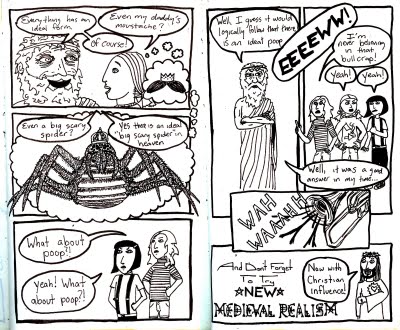Third-force psychology-Critique and interpretation
Third-force psychology reresents to me an interesting mix of useful change and hypocrisy. It’s usefulness comes in it’s challenge to the other schools of psychology in focusing in on the patient more (for example, psychiatry is trending towords more medication management and spends less and less time with patients). Third-force psychology brings a more humane focus to psychology, which is good. Yet, where it excels, it also fails. Because, I then feel that it goes to far in how much it focuses on humans, and alienates the other fields of psychology. Without using emprical data or any terms of labeling third-force psychology leaves itself in a rut. And because it rejects a lot of the testing other fields of psychology use, they pass up many chances for collaboration or cooperation.
And again, third-force psychology runs into a problem. It rejects labeling, yet it tells us that there is something wrong in the way we think that must be rejected or changed. Third-force criticizes other branches of psychology for “diagnosing” problems, yet it does the very same thing. I know that realistically, a lot of third force psychologists probably don’t hold this extreme view, yet it seems too big a flaw to overlook.
I also think third-force psychology fails in it’s inability to explain more than a small section of psychological problems. It definitely has is uses however. I really like Maslowe’s hiearchy of needs, which I believe has a lot of uses outside of psychology (mission work, business, rebuilding in disaster zones ect). And I enjoy the more holistic approach that third force psychology offers to mental health couselors.
I believe third force psychology has a lot to offer, but at the same time I find that a lot of what it does offer is too subjective and unscientific. Third-force psychology really is a product of the “post-modern” age. It embodies a lot of the humanistic philosophies (which I disagree with to an extent). Perhaps it’s a matter of opinion. But I believe that like Gestalt Psychology, third-force will eventually fade to the background as post-modernism begins to pass.



Ian Robertson on Percieved Reality
1:49 pm, 10.04.10
The idea of perception vs reality is such a tired debate, but one that modern science and philosophy likes to drag us into. I myself would argue that our senses is our only way to understand the world. Any information we do get is from our senses, so even pure rational depends on the senses for input. Life ends up being our best shot anyways, no human has ever got it right on their own. Our perception is a best guess, and we can never separate ourselves from our bodies, so even if senses can be fooled we can overcome that if we try, and if not we did our best.
Ian Robertson on What's Love Got to Do with It?
1:45 pm, 10.04.10
I have heard the evolutionary/genetic theory of love before. I believe it is the famed atheist Dawkins who claims that the more genetic material we share with someone, the more we love and the more we are willing to sacrifice ourselves to defend that person. So I would willing sacrifice myself more easily for my child or sibling then I would for my cousin. But I would more easily sacrifice myself for my cousin then a total stranger, because we share more genetic material. However, there is some evidence that refutes this. There are many families that have no love at all and would willing take the side of a stranger over their own family. It’s an interesting theory but it still needs some fleshing out to overcome a lot of the anecdotal evidence that stands against it.
Ian Robertson on Humor
1:41 pm, 10.04.10
I for one love to laugh. I think laughing, and smiling for that matter, is the best way to try to cheer someone up after something upsetting. Laughter is a good way to turn someone from a bad mood to a good mood. Thats why I admire the story of Patch Adams, he sought to go beyond normal medicine to help his patients, citing laughter as something with power beyond regular medicine can offer. Mind you, is someone had just lost a loved one, I would try to crack a joke or tickle them to get them to stop mourning. Nor would I try to joke with someone with cancer to heal them. But laughter can be very powerful and can be a great supplement to help heal someone’s body and spirit.
Ian Robertson on Prosthetics and Ethics
1:22 pm, 10.04.10
I think it is very interesting that we can “fool” the brain into believing that a lost limb had been resurrected by use of vision and a mirror. It’s even more interesting because the patient is fully aware that the reflection is not the limb, but the brain doesn’t know. I think it bodes well for psychology as a form of medicine.
Perhaps the best way to treat phantom limb is a combination of psychotherapy and prosthetics. I don’t it really violates ethics however, the patient is fully aware that the limb is not there, its the brain that hasn’t figured it out, and the patient isn’t being fooled by the mirror, the brain is.
Ian Robertson on Psychology as a Science
3:18 pm, 09.20.10
However, it seems lately that there is a more negative views in calling psychology, economics, sociology and other “social sciences” actual science. I wonder if there is merely a question of what is more prestigious, hard sciences or social/soft sciences. Physics, geology, chemistry can all be measured and are consistent, where human behavior is not. Psychiatry also seems to want to distance itself from psychology, because it can measure heart rates, neuron activity, and neurotransmitters and is not dependent on so much of the speculation that seems to prevalent in other branches of psychology. It’s interesting to see where the line is drawn in the future in what is call science and what is merely called scientific study.
Ian Robertson on Categories of thought- Kant
3:12 pm, 09.20.10
Well perhaps was actually able to boil down all of the basic ways that a human thinks. But I wonder if this is the way that only westerners think. I wonder if someone from an Easter culture was to boil down all of the ways that Eastern people think if the “categories” would be the same. An empiricist might be able to argue that these categories are learned, I don’t think anybody has memories to their infant hood that could say whether or not they thought in the form of these categories all of their lives.
Ian Robertson on Who am I? Lost.
3:10 pm, 09.20.10
It’s interesting that so many thinkers come to the conclusion that there is a set path for life. Skinner and behaviorists, Calvin and predestination, this Guru of yours. Yet, when we say things like “I change my mind,” we think that it is ridiculous that events before us have already fixed our path in life. Yet, we really can’t know. Unless we are able to step out of time and space and see how everything really works, unless we were able to comprehend everything, I don’t think we can really figure it out.
Ian Robertson on Acu and the cave allegory
3:49 pm, 09.12.10
It’s interesting that the girls in your Bible Study believe that a building is the best way to lead people to Christ. Ignorance is a great comforter to the American Church. If we do not know people are dying from hunger and exposure, we need not help them. If we don’t know that having a relationship with someone is the best way to bring them to Christ, we don’t need try, only show up to a building. We lack a lot of humility in the American Church. Most cite that humility is needed when someone is right, and that they need not boast about their triumph, but the fact is that we need humility when we are wrong. Without humility we cannot be challenged, and without challenge we cannot grow as Christians. I’m sorry to hear that the girls in your Bible Study were not humble enough to hear the truth you were trying to say. Perhaps they are best represented by the people in Plato’s cave, and that they did try to tear you apart. But the best thing to remember, something Plato didn’t cover in his allegory, is that as Christians we are called to love the people in the chains.
Ian Robertson on Hedonism vs. Epicureanism
3:34 pm, 09.12.10
You make an interesting point. But I would have to ask the question, is there any room for Epicureanism in modern society? It seems that society forces us to take extremes. In the United States, people tend to gorge themselves on television, music, and other forms of electronic media. The very same media that pushes us to take on extremes of bodily form, the skinniest women and super buff men. I find it interesting that the more we submerge ourselves into an electronic world, the currents of Capitalism seem to want to bring us further into that world. Even ACU is pushing the electronic agenda, every student being equipped with an itouch and testing out new books on iPads. I wonder on how easy it is to strike a balance, a golden mean in a world that wants us to take something and take it even further to turn a profit.
Ian Robertson on Views on the Cave
9:21 pm, 09.05.10
I think it would be cool to apply the allegory of the cave as a comparison with a lot of the prophets of the Old Testament. So many of the Prophets were “enlightened” by God, the light source in this case, and preached to the Israelites. The Israelites, as the chained people in the cave, most definitely killed quite a few of prophets.
The allegory of the cave is definitely very open ended and it’s interesting on how you can use it to explore different ideas. I also think it’s interesting on how there are real life situations which exemplify the story.